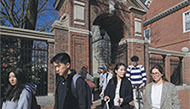▶ Korean Americans head to song rooms to enjoy an uninhibited pastime that, while it may look like karaoke, is part cultural nostalgia and part social bonding.
Times Staff Writer
Reprinted with Permission from the Los Angeles Times
When the sun goes down and day? work is done, Korean Americans think fun by going out to sing.
They head out to Los Angeles Koreatown, where they rent a song room norae-bang by the hour and sing to their heart? content.
?t? a wonderful way to get rid of the stress, says Tong S. Suhr, a prominent Korean American attorney whose baritone voice is much admired in churches and in song rooms.
A norae-bang is a great venue for different generations to get together and have fun, said Hyepin Im, a venture capitalist in her early 30s.
?t encourages the younger generation to learn Korean, too, she said, ?t helps kids to connect with their parents.
For Koreans, who consider themselves a ?inging people, the song rooms of Koreatown take the Japanese-born karaoke concept to a new level.
In the privacy of comfortably furnished rooms, with overhead lights flashing and television monitors displaying words to follow, they sing, dance and renew friendships late into the night.
When all the singing makes them hungry, waiters and waitresses in crisply ironed white shirts and black pants are ready to take their orders.
On one recent evening after work, Suhr and his friends got together to engage in this favorite Korean pastime at Rosen Music Studio on 8th Street, one of the oldest and most popular song rooms in town.
It was after 9 p.m. when Suhr? party arrived, but the evening was just getting started.
Purple neon lights, flashing the name of the establishment, beckoned passersby. Patrons of all ages arrived in twos, threes and larger groups and disappeared into darkened song rooms. Rosen has more than 30 rooms of various sizes.
The lobby was illuminated by the glow of revolving iridescent lights and a giant TV screen. The proprietor of the establishment, a middle-aged man with an impassive expression, juggled customers and phone calls from behind the counter.
Near him were a prominent display case containing a wide selection of spirits and a refrigerator, well-stocked with soft drinks and Korean beer.
In a large song room, rented at $35 an hour, attorney Dennis Chang got the evening rolling by pretending to be Elvis Presley singing a Tony Bennett song: ? Left My Heart in San Francisco.
Businessman Paul Kim joined him on the floor, combining singing with gyrations that prompted a squeal of laughter from women in the room.
Not to be outdone, Suhr did his number in Korean a nostalgic Korean song that elicited cries of ?otta, jotta! (Right on, right on!) from the men.
By the night? end, they had sung more than two dozen popular Korean and Western songs, downed several plates of sliced fruit, peanuts and dried cuttlefish and consumed a good amount of soft drinks, beer and spirits. They were laughing and relaxed.
No matter what the occasion, Koreans have a song to sing, said Suhr, a longtime leader of Los Angeles Korean American community. ?o one enjoys singing as much as Koreans. Koreans are the Italians of the East.
Ann H. Park, who is a prosecutor by day, said she considers a night out at the song rooms inexpensive but effective therapy.
?t lets you let out emotions in different ways, she said. ?hen you?e singing, you?e moving around, having fun with people. It? a very good therapy.
One doesn? have to sing to have fun, however.
? don? sing, but I like coming to a norae-bang because you can let go of your inhibitions; you are among friends and you can go crazy, said Soo Jin Na, who teaches information technology.
In a song room, acting crazy is accepted.
For Kim, who brought down the house repeatedly with his play-acting, the fun part is helping his friends enjoy themselves by serving drinks and snacks and entertaining them with his antics.
? try to make it fun, Kim said, ?hich makes me feel good too.
Songs Reflect Korean History
Singing is an important part of Korean life because historically Koreans did not have the luxury of other recreation, Suhr said. They had a hard enough time just eking out a living.
?o we sang as we labored, Suhr said. ?oreans sang when they harvested crops. Mourners on funeral marches sang, too a duet form which was a precursor to rap.
Many Korean songs are sad and in minor keys, Suhr said, because they reflect the tumultuous history of the Korean peninsula that for centuries was at the mercy of foreign conquerors. Ordinary Koreans feelings of helplessness about their fate became part of the songs they sang.
?e are a people filled with han [unrequited woe], so we sing to unburden ourselves, he said. ?emember, Koreans say birds cry when other people say birds sing.
Poverty also encouraged the development of the singing culture because it didn? cost anything to sing, said Suhr, who is an unofficial historian of Korean traditions.
Singing has helped Koreans maintain their mental health, said Beatrice Choi, a Korean American clinical psychologist. Choi, who treats many younger Korean Americans, says singing can do them good.
?t? good for their mental health she said.
?oreans are not a verbally oriented people who express everything with words. Koreans communicate through singing and in other nonverbal ways because they are so attuned to each other, Choi said.
Even in Los Angeles, Koreans like to conclude important get-togethers by taking turns singing a song.
For Korean American professionals like Im, singing is a ?onderful social tool for bonding with each other.
Koreatown has dozens of song rooms, some with such colorful names as ?ith Two Feet, Regrets and ?nside the Forest. Some are pricey spots favored by prosperous businessmen and professionals entertaining guests and where a patron can run up a $l,000 tab in no time. Others cater to the younger crowd, offering pool halls and game rooms. Rosen falls in the middle, with a varied clientele that includes accountants, market owners and a well-known Korean TV anchorman.
Open until 2 a.m., song rooms don? come alive until well after l0 p.m., even on weeknights. On weekends, younger patrons, taking advantage of low-priced ?appy hours, begin gathering as early as 5 p.m.
Ambience and clientele vary from establishment to establishment. But there is one thing that is a constant.
No matter which song room they choose, Korean American men sing Frank Sinatra? ?y Way during their night out.
? don? know for sure why the guys always sing that song, said Im, but she suspects that the song serves as a bonding ritual.
스마터리빙
more [ 건강]
[ 건강]이제 혈관 건강도 챙기자!
[현대해운]우리 눈에 보이지 않기 때문에 혈관 건강을 챙기는 것은 결코 쉽지 않은데요. 여러분은 혈관 건강을 유지하기 위해 어떤 노력을 하시나요?
 [ 건강]
[ 건강]내 몸이 건강해지는 과일궁합
 [ 라이프]
[ 라이프]벌레야 물럿거라! 천연 해충제 만들기
 [ 건강]
[ 건강]혈압 낮추는데 좋은 식품
[현대해운]혈관 건강은 주로 노화가 진행되면서 지켜야 할 문제라고 인식되어 왔습니다. 최근 생활 패턴과 식생활의 변화로 혈관의 노화 진행이 빨라지고
사람·사람들
more
[한인단체 신년 인터뷰] KYCC 송정호 관장… “지역사회 위한 종합 서비스 강화”
LA 한인타운 대표 비영리단체 한인타운청소년회관(KYCC)의 송정호 관장은 “지금 우리가 하는 일은 커뮤니티 ‘니즈’가 있기 때문에 존재한다”…

[한인단체 신년 인터뷰] LA 평통 장병우 회장… “본연 역할로 한반도 평화 실질 기여”
민주평화통일자문회의 LA협의회(이하 LA 평통) 장병우 회장은 6일 본보와의 신년 인터뷰에서 붉은 말의 해인 병오년 새해를 맞아 신년 화두로 …
워싱턴주에 첫 한인 시의장
워싱턴주에서 첫 한인 시의회 의장이 탄생했다. 제이슨 문(한국명 문태원) 머킬티오 시의원이 새해 들어 시의장으로 선출되며 또 하나의 중책을 맡…
국회 방문단 대한인국민회 방문
윤후덕·이해식·김한규 의원과 조오섭 국회의장 비서실장 등 10여 명의 한국 국회방문단이 지난 5일 LA를 찾아 로즈데일 묘지와 국민회관 등 미…
[한인단체 신년 인터뷰] 명원식 파바월드 회장… …
“한인 차세대들이 바르게 자랄 수 있는 토대를 만드는 것이 제가 파바월드의 회장으로 존재하는 유일한 이유입니다”한인사회의 대표적 청소년 봉사 …
많이 본 기사
- 트럼프, 그린란드 희토류 탐내지만… “채굴도, 정제도 어려워”
- 트럼프 이민 규제에… ‘美입국 일본인 유학생’ 3천명 감소
- 트럼프 “AI 데이터센터 탓 국민의 높은 전기료 부담 원치 않아”
- 李대통령, 일본 도착…오후 다카이치 총리와 정상회담
- 트럼프 “이민자 시민권도 박탈한다” 1
- 미네소타주, ‘ICE 총격’ 반발해 소송… “연방의 침공, 중단돼야”
- 이란시위 사망자 6천명설…트럼프, 협상·군사개입 저울질
- “집값보다 무서운 유지비”… 올해도 재산세·보험료↑
- 金총리 “사이비 이단, 척결할 사회악…통일교·신천지 철저수사”
- 타코마 한인여성 금목걸이 강도당해...레이크우드 한인 쇼핑몰서 남녀에게 교묘하게 빼앗겨
- ‘정권교체 대신 고쳐쓰기’…미국의 새로운 불량국가 대책될까
- 벨뷰통합한국학교, 봄학기 등록 시작...특별활동반 확대 개설해 18개로…종이접기•난타•합창반 신설
- 시혹스, 샌프란과 시애틀서 격돌...17일 루멘필드서 NFC 플레이오프 디비저널 라운드로
- “미국에 집 2채” 전태풍, 놀고 먹는 남편..음주가무에 흡연까지 [동상이몽2]
- 또또 반전.. “1년간 법카 1억 넘게 쓰고, 합의금 5억 요구” 박나래 前 매니저 ‘새 녹취록’, 진실은
- ‘케데헌’, 골든글로브 2관왕 차지...제83회 시상식서 애니메이션 및 ‘골든’ 주제가상 영광
- “고점일때 사도 주식투자가 낫다”...이병주 박사, SNU포럼서 강의…‘시장 타이밍보다 시간’강조
- 美국무, 온두라스 대통령 당선인과 회동…베네수 안정도 논의
- “귀화 시민권 박탈 기준 검토” 파장 1
- 에어프레미아, 연중 최대 할인
- “이란 시위로 648명 사망…6천명 넘게 숨졌을 가능성”
- 尹 구형할 내란 결심공판 다시 시작…최종 ‘마라톤 변론’ 예고
- 내 개인정보 모두 다크웹에?… 지금 당장 해야 할 일들
- 中에 무력했던 美, 핵심광물 공급망 강화하려 韓 등 우방 규합
- ‘코요테 주의’… 남가주 주택가서 급증
- 유럽의회, 이란 외교관 출입 전면 금지…EU, 추가 제재 고려
- ‘불법명령 거부’ 촉구 의원, 軍계급강등 추진 美국방에 소송
- 사상초유 美대통령-연준의장 정면충돌…법무부의 자충수 되나
- “최대 6천불 추가 공제돼요”
- 적수 없는 ‘세계 최강’ 안세영, 새해 첫 대회부터 3연패 ‘금자탑’
- 트럼프 “이란과 거래하는 국가, 대미 거래시 25% 관세 부과”
- 은퇴 고민하던 보아, 25년만 결국 SM 떠난다.. “자부심이자 자랑이었다”
- VA 페어팩스 세금 폭탄에 기업·주민‘탈출 러시’우려
- H-1B 비자 등 최대 3천달러 육박… 1
- ‘좀비(zombie)체제’가 무너질 … 2
- LA 길거리 매춘 단속 대폭 강화… “고객도 처벌”
- 뉴욕증시, 파월 수사 둘러싼 경계감 속 저가 매수…강세 마감
- 새해 통신·구독료 줄이자… 휴대전화·인터넷 요금 점검부터
- 백악관, 이란 관련 “외교가 제1옵션이나 군사옵션도 주저안해”
- “항상, 뉴진스가.. “다니엘, 눈물로 전한 ‘퇴출’ 심경
- 방미 통상본부장, 美강경파 의원에 ‘韓플랫폼 규제 입법’ 설명
- ‘나혼산’, 다 거짓? “박나래 남자친구도 새벽 회동..반려견 복돌이 돌본 적 없다” 前 매니저 반격
- “모기지 금리 인하 위해 2,000억달러 투입”
- 돈로 독트린
- [조지 F. 윌 칼럼] 트럼프의 무면허 괴물 사냥
- 운이 가득한 2026년을 기원하며
- 워싱턴주 물가 비싸도 가족부양하기 좋다...월렛허브 연례 조사서 전국 50개주중 13위로 지난해와 동일
- 트럼프 압박에 파월 ‘발끈’…사상초유 대통령-연준의장 정면충돌
- [인터뷰] “최고의 경영 강좌… 강력한 네트웍 강점”
- “이정후, 빨리 우익수로 옮겨라!” SF 담당 베테랑 기자, 구단 ‘외야 플랜 실패’ 맹비판
1/5지식톡

-
 한국 안경을 무료 배송으로 받아보실…
0
한국 안경을 무료 배송으로 받아보실…
0안녕하세요. 서울 안암동에 위치한 ‘보고싶다 안경원’입니다.저희는 다년간 한국 고객분들께 착용감 좋은 안경테와 한국안경브랜드,고압축 도수 렌즈를 합리적인 가격에 제공해온 안경 전문점입니다.이번에 해외 배송이 가능해…
-
 미 육군 사관학교 West Poin…
0
미 육군 사관학교 West Poin…
0https://youtu.be/SxD8cEhNV6Q연락처:wpkapca@gmail.comJohn Choi: 714-716-6414West Point 합격증을 받으셨나요?미 육군사관학교 West Point 학부모 모…
-
 ☝️해외에서도 가능한 한국어 선생님…
0
☝️해외에서도 가능한 한국어 선생님…
0이 영상 하나면 충분합니다!♥️상담신청문의♥️☝️ 문의 폭주로 '선착순 상담'만 진행합니다.☎️ : 02-6213-9094✨카카오톡ID : @GOODEDU77 (@골뱅이 꼭 붙여주셔야합니다…
-
 테슬라 자동차 시트커버 장착
0
테슬라 자동차 시트커버 장착
0테슬라 시트커버, 사놓고 아직 못 씌우셨죠?장착이 생각보다 쉽지 않습니다.20년 경력 전문가에게 맡기세요 — 깔끔하고 딱 맞게 장착해드립니다!장착비용:앞좌석: $40뒷좌석: $60앞·뒷좌석 …
-
 식당용 부탄가스
0
식당용 부탄가스
0식당용 부탄가스 홀세일 합니다 로스앤젤레스 다운타운 픽업 가능 안녕 하세요?강아지 & 고양이 모든 애완동물 / 반려동물 식품 & 모든 애완동물/반려동물 관련 제품들 전문적으로 홀세일/취급하는 회사 입니다 100% …
케이타운 1번가
오피니언
 옥세철 논설위원
옥세철 논설위원‘좀비(zombie)체제’가 무너질 때…

돈로 독트린
 조지 F·윌 워싱턴포스트 칼럼니스트
조지 F·윌 워싱턴포스트 칼럼니스트 [조지 F. 윌 칼럼] 트럼프의 무면허 괴물 사냥
 전지은 수필가
전지은 수필가 승리의 여신은 언제까지?
 신경립 / 서울경제 논설위원
신경립 / 서울경제 논설위원[만화경] 그린란드의 하얀 금

무분별 이민 단속이 불러온 비극

무면허 건축업자 피해 근절돼야
 메건 매카들 워싱턴포스트 칼럼니스트
메건 매카들 워싱턴포스트 칼럼니스트 [메건 매카들 칼럼] 마두로는 체포했지만… 베네수엘라 석유 생산 회복은?
 김미선 서북미문인협회 회장시인
김미선 서북미문인협회 회장시인 [한국춘추] 새해, 북방의 한국인을 생각하며
1/3지사별 뉴스

‘ICE 총격’ 주말 미 전역 항의 시위
미네소타주 미니애폴리스에서 연방 이민세관단속국(ICE) 요원의 총격에 30대 시민권자 여성이 사망한 사건에 항의하는 대규모 시위가 주말동안 뉴…
“귀화 시민권 박탈 기준 검토” 파장

새 VA 주지사는 의원을 좋아해
민주당 아비가일 스팬버거(Abigail Spanberger) 버지니아 주지사 당선자는 오는 17일 취임을 앞두고 내각 인선을 거의 마무리한 상…
VA 페어팩스 세금 폭탄에 기업·주민‘탈출 러시’우려

트럼프 압박에 파월 ‘발끈’…사상초유 대통령-연준의장 정면충돌
트럼프 대통령과 중앙은행 수장이 정면 충돌하는 사상 초유의 상황이 전개되고 있다.제롬 파월 연방준비제도(Fed·연준) 의장이 자신을 겨냥한 도…
살림으로 뿌리내리다- 테이크루트 안미정 대표의 요리 이야기 (9)



















































.png)


댓글 안에 당신의 성숙함도 담아 주세요.
'오늘의 한마디'는 기사에 대하여 자신의 생각을 말하고 남의 생각을 들으며 서로 다양한 의견을 나누는 공간입니다. 그러나 간혹 불건전한 내용을 올리시는 분들이 계셔서 건전한 인터넷문화 정착을 위해 아래와 같은 운영원칙을 적용합니다.
자체 모니터링을 통해 아래에 해당하는 내용이 포함된 댓글이 발견되면 예고없이 삭제 조치를 하겠습니다.
불건전한 댓글을 올리거나, 이름에 비속어 및 상대방의 불쾌감을 주는 단어를 사용, 유명인 또는 특정 일반인을 사칭하는 경우 이용에 대한 차단 제재를 받을 수 있습니다. 차단될 경우, 일주일간 댓글을 달수 없게 됩니다.
명예훼손, 개인정보 유출, 욕설 등 법률에 위반되는 댓글은 관계 법령에 의거 민형사상 처벌을 받을 수 있으니 이용에 주의를 부탁드립니다.
Close
x